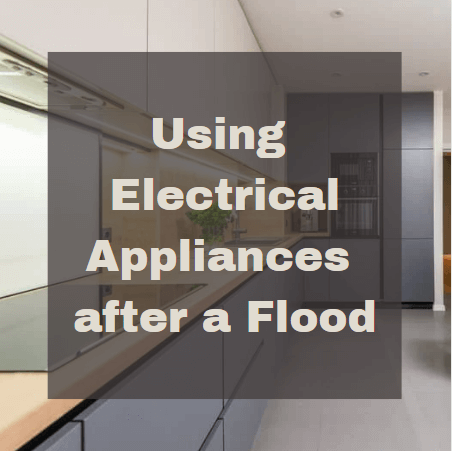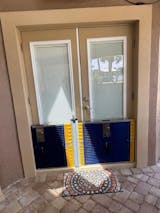Using electric appliances after they get flooded can be dangerous and is generally not recommended until they have been properly inspected, cleaned, and deemed safe by a qualified professional. Here are some important considerations:
Safety First: Always prioritize your personal safety. Do not enter flooded areas or handle electrical appliances while standing in water or if there is a risk of electrocution.
Disconnect Power: Turn off the main electrical supply to your home or specific circuits connected to the affected areas before attempting any inspection or cleaning.
Consult a Professional: It is advisable to contact a certified electrician or appliance repair technician to evaluate the condition of your appliances. They can assess the damage and advise on whether the devices can be safely used or need repairs.
Drying Out: If your appliances have been exposed to water, they need to be thoroughly dried before attempting to use them. This may involve disassembling certain parts and allowing them to air-dry. However, it is essential to consult a professional to ensure proper drying techniques are employed to prevent further damage or safety hazards.
Clean and Sanitize: Flooding can introduce contaminants and bacteria into appliances. Proper cleaning and sanitization are crucial. The technician can guide you on the appropriate cleaning methods or recommend professional cleaning services.
Replacement Consideration: Depending on the extent of the damage, it may be necessary to replace certain appliances entirely rather than attempt repairs. A professional can help you assess whether repair or replacement is the best course of action.
Remember, electricity and water can be hazardous combinations. To ensure your safety and the proper functioning of your appliances, it is strongly recommended to consult with professionals before using electric appliances after a flooding event.

Why is it dangerous to use electric appliances with water damage?
Using electric appliances after a flooding event can be dangerous for several reasons:
Electrical Shock Hazard: Flooding can cause water to come into contact with electrical components and wiring, leading to the risk of electrical shock. Water is a good conductor of electricity, and if appliances are not properly dried and cleaned, they can retain moisture and pose a serious electrocution hazard to anyone who comes into contact with them.
Damage to Internal Components: Water can damage the internal circuitry, motors, and other sensitive parts of electric appliances. This can result in malfunctions, short circuits, and overheating, which can lead to fires or further electrical hazards.
Contamination and Bacterial Growth: Floodwater is often contaminated with bacteria, chemicals, and other pollutants. When water enters appliances, it can introduce these contaminants into the internal components. Using appliances without proper cleaning and sanitization can expose you to health risks and potentially spread contaminants throughout your home.
Hidden Damage: Even if an appliance appears to be dry on the outside, water may have seeped into internal areas that are not immediately visible. Moisture can accumulate in insulation, wiring, and other hard-to-reach parts, leading to long-term damage and safety concerns.
Insulation Compromise: Water can compromise the insulation on wires, making them more susceptible to short circuits and electrical hazards. Damaged insulation increases the risk of electrical shock when using the appliances.
To ensure the safety of individuals and prevent further damage to appliances, it is crucial to have them inspected, cleaned, and repaired by professionals before using them after a flooding event. This will help mitigate the risks associated with electrical hazards and ensure that the appliances are safe to use.

How can I prevent electric appliances from getting flooded and minimize the risk?
Preventing electric appliances from getting damaged in flooding can be challenging, but there are some preventive measures you can take to minimize the risk. Here are some steps you can consider:
Elevate Appliances: If you live in an area prone to flooding, consider elevating your appliances on platforms or stands. This can help keep them above the water level in case of a flood.
Create Barriers: Install barriers, such as sandbags or flood barriers, around the perimeter of your home to redirect water flow away from the building and prevent it from reaching appliances.
Secure Outdoor Units: If you have outdoor appliances such as air conditioning units or generators, make sure they are securely anchored or mounted on elevated platforms to minimize the risk of water damage.
Seal Entry Points: Seal any cracks, gaps, or entry points where water can enter your home, especially around utility connections such as electrical panels and HVAC units. Proper insulation and sealing can help reduce the risk of water infiltration.
Install Backflow Preventers: Consider installing backflow preventers on your plumbing system to prevent contaminated floodwater from backing up into your appliances and plumbing fixtures.
Have Proper Drainage: Ensure that your home has a well-functioning drainage system, including gutters, downspouts, and proper grading around the foundation. This can help divert water away from the building and reduce the risk of flooding.
Store Appliances at Higher Levels: If a flood is imminent or you anticipate potential water damage, move smaller appliances to higher levels in your home, such as by placing them on elevated countertops or tables.
Get Flood Insurance: Consider getting flood insurance coverage for your home and appliances. It can provide financial protection in the event of flood-related damage.
While these measures can help reduce the risk of appliance damage, it is important to remember that they might not be foolproof. In the event of a flood, it is still crucial to follow safety guidelines, disconnect power, and consult professionals for guidance on appliance inspection, cleaning, and repairs.
Want to know more about modern flood control and flood safety? Contact Dam Easy today and follow us on social media. Our team will navigate you through the world of the most efficient anti-flooding solutions and help you floodproof your house or business so you can stay safe if disaster knocks on your door.
Flood Barrier Door Dam - Ultimate Flood Gate

€779,00
DAM EASY® FLOOD GATE - DOOR DAM Floods are becoming more common around the world. What was once a 100-year phenomenon is now a seasonal trend that homeowners must deal with. That’s EXACTLY why you need this Dam Easy Flood… Read More
Contact Dam Easy today and ensure your safety in the face of the upcoming flood season!



















